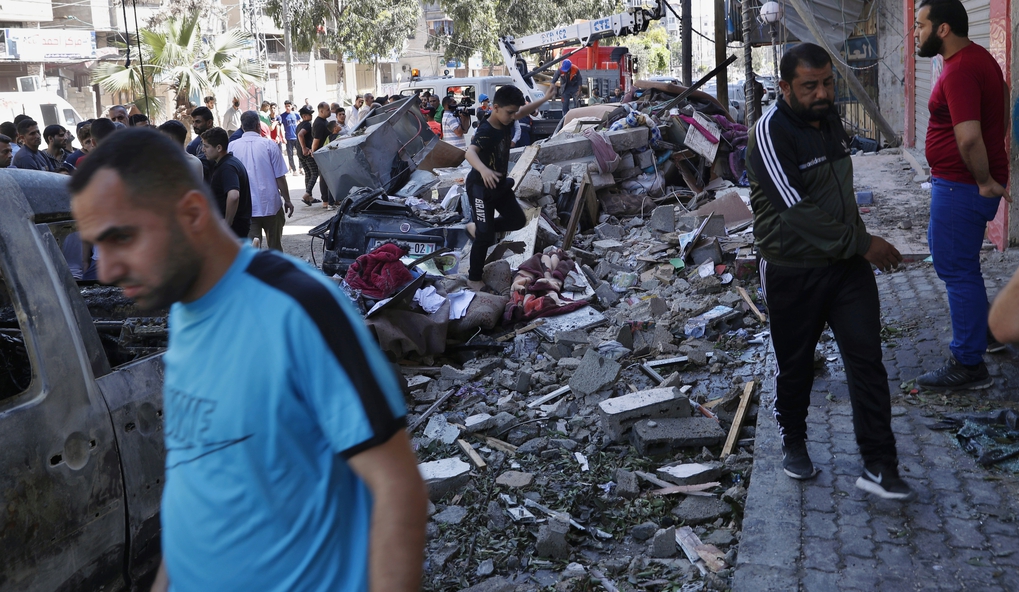first published in Seattle Times

People inspect the rubble of the destroyed Abu Hussein building hit by an Israeli airstrike in Gaza City in the early morning Wednesday, May 19, 2021. (AP Photo / Adel Hana)
By Alice Rothchild Special to The Times
Gaza is roughly a 26-by-6-mile strip of land with 2 million people living under a brutal 14-year siege where, until last week, they were struggling to control a rampant COVID-19 outbreak. Now, in just nine days, using the most advanced and lethal weaponry the United States can provide, an estimated 219 Gazans have been killed, including 63 children, 1,500 injured with 72,000 internally displaced. Dozens of educational facilities, six hospitals and 11 primary health care centers have been damaged, and water, sanitation and electrical infrastructure bombed. Israel is not allowing the entry of vaccines, and it damaged the only testing lab. There would be no available hospital beds and a shortage of critical medications and oxygen if someone were to be diagnosed with the virus.
Despite President Joe Biden’s unwavering support for Israel, framed in the “Israel has a right to defend itself” and there is “no daylight between us” mantras, and his late and tepid suggestion that a cease fire would be really welcome, there are voices in Congress accusing Israel of gross human-rights violations and functioning as an “apartheid state.”
Similar challenges to the dominant narrative are bubbling into the political and social fabric of the U.S. with the growth of more visible and outspoken Palestinians and Arabs emerging from the post 9/11 anti-Arab terror. There are increasing challenges to Israeli policies on campuses, a growing international boycott, divestment and sanction movement, and the rise of grassroots and human-rights organizations, including Black Lives Matter, who see cross-sectional relationships between police brutality in Minneapolis and East Jerusalem. Add to this the searing capacity of social media to report in real time without the censorship of mainstream media and mainstream prejudices. The framing is changing.
Israelis are shocked by the 3,500 rockets that have been launched by Hamas militants in Gaza. A dozen people have been killed and hundreds injured. Perhaps even more disturbing to Jewish Israelis is the massive show of solidarity and support by Palestinians with Israeli citizenship and those living under occupation in East Jerusalem and the West Bank. People are fearful that a civil war may be brewing. Palestinians have clearly reached a breaking point after suffering from 72 years of racist and exclusionary policies by the Israeli government, its ongoing seizure of Palestinian homes in East Jerusalem and the increasingly rightward, tending toward fascistic, political parties.
While Israel is claiming that it is the victim of Arab hatred, a more accurate accounting is easily available and even being reported in some mainstream papers. The immediate trigger lies in the Israeli government’s evictions of Palestinian families from their homes in the East Jerusalem neighborhood of Sheikh Jarrah to make way for Jewish settlers. These Palestinian families were originally expelled by Israeli soldiers from their homes in Haifa and Jaffa in 1948. Twenty-eight families were settled in Sheikh Jarrah in the 1950s by Jordan in coordination with the United Nations Relief and Works Agency for Palestine Refugees in the Near East. In the 1960s, in exchange for renouncing their refugee status, the families received official property deeds and became owners of their homes.
When Israel seized East Jerusalem in 1967, it created a settlement plan to build a crescent of settler units and parks around the Old City and remove the Palestinians through outright confiscation and tortured legal battles. Twenty-thousand Palestinian homes are currently at risk for demolition.
While facing evictions, with tensions mounting and Ramadan coming to a close, the Israeli authorities chose to block Palestinians from outside Jerusalem access to Al Aqsa Mosque, one of the holiest sites in Islam on one of the holiest days. There was more violence on Jerusalem Day, a nationalistic celebration of the Israeli capture of East Jerusalem. Police then stormed Al Aqsa shooting rubber-tipped bullets, stun grenades and tear gas at praying Palestinians and others (not surprisingly) throwing stones (the weapon of choice for the disenfranchised, enraged and humiliated). Three hundred thirty Palestinians were injured.
With all these provocations, in the context of decades of occupation and crushing hopelessness, it is not surprising that Hamas militants began launching rockets. That has repeatedly been the only way they can get international attention. The Teflon-like Israeli Prime Minister Benjamin Netanyahu may have wanted a war to rally a doubting Israeli public and avoid a looming jail sentence. He has done that before.
This is not a battle between two equal parties, but a struggle where one of the strongest military powers in the world is determined to disinherit and humiliate a dispossessed people. This is a 70-plus year example of aggressive settler colonialism occurring in the context of the inability of the international community to see Palestinians as equally human, traumatized and deserving as Jewish Israelis. Unless the international community forces Israel to deal with the root causes of this disaster, this tragedy will only repeat itself.
Alice Rothchild is a Seattle author, filmmaker, and retired obstetrician-gynecologist. She is author of three books, most recently “Condition Critical: Life and Death in Israel/Palestine,” and has contributed to a number of anthologies including “Reclaiming Judaism from Zionism: Stories of Personal Transformation.” She is on the board of We Are Not Numbers, Gaza Mental Health Foundation and active in Jewish Voice for Peace.